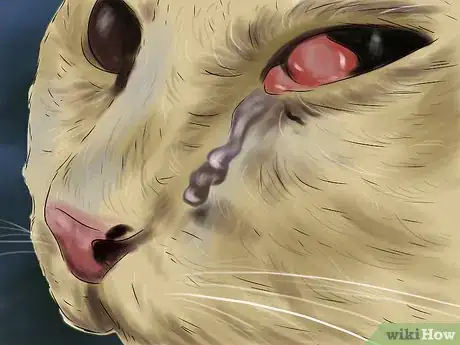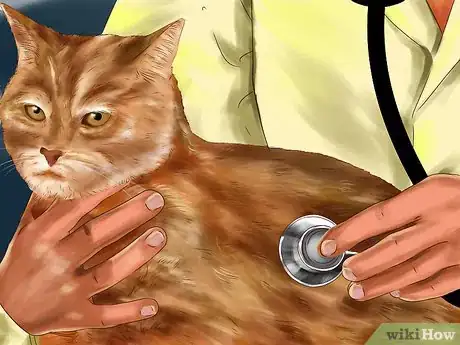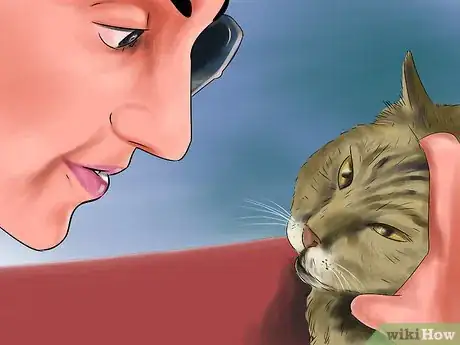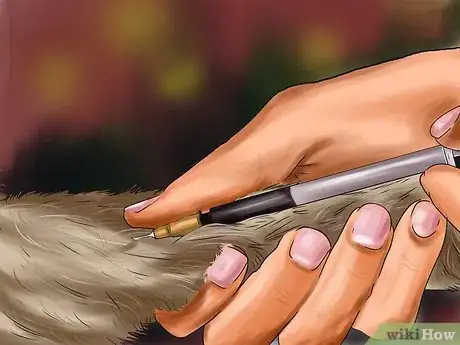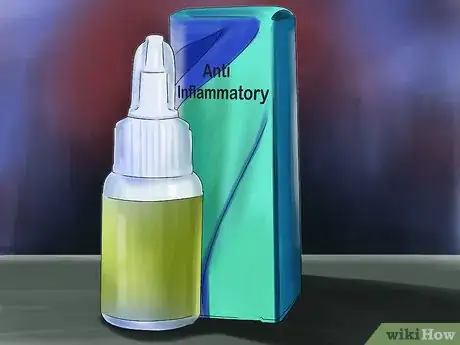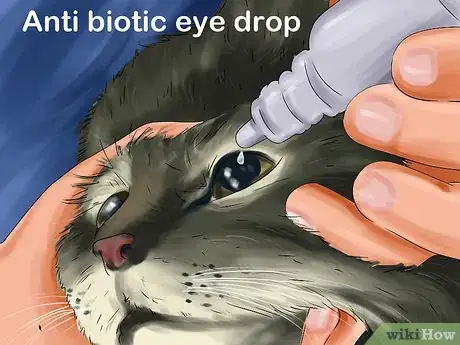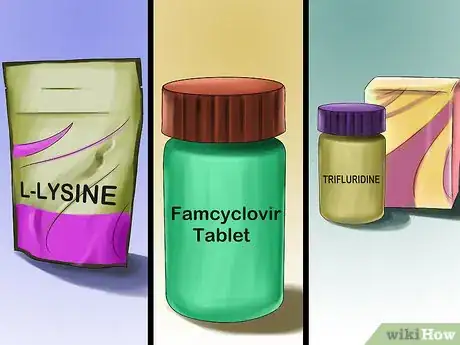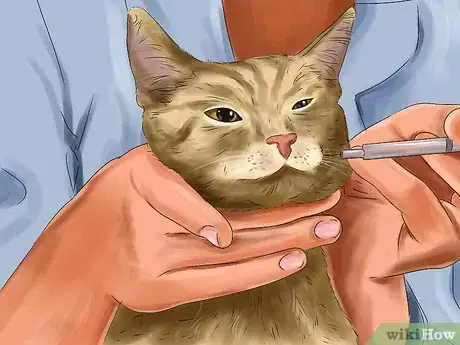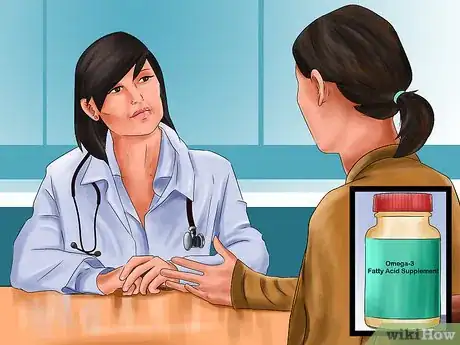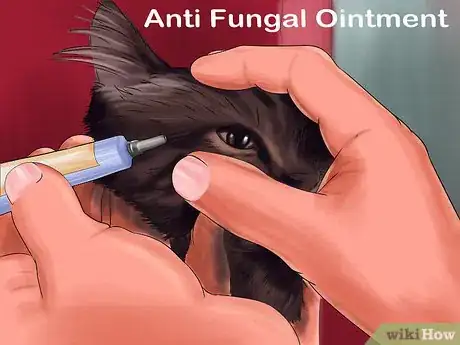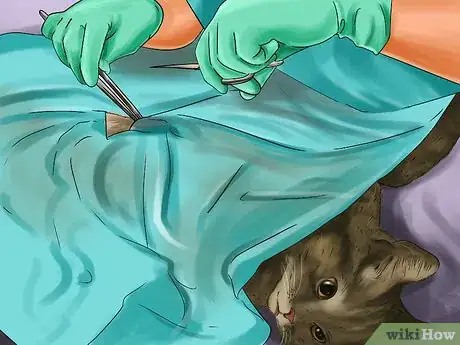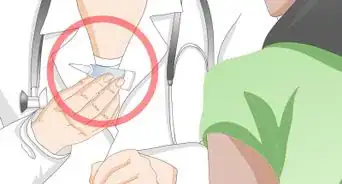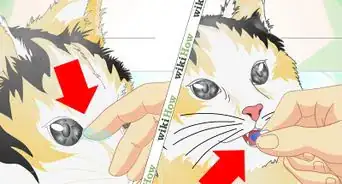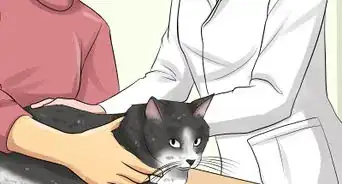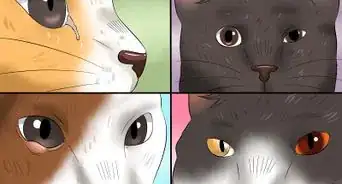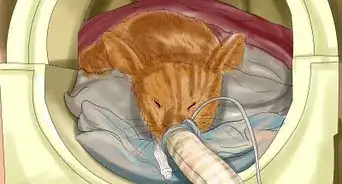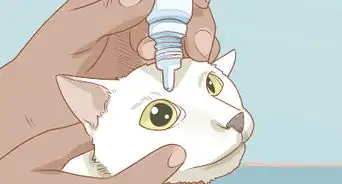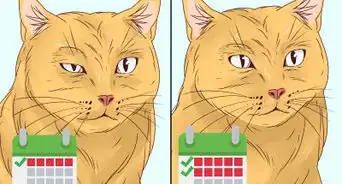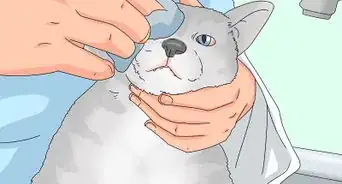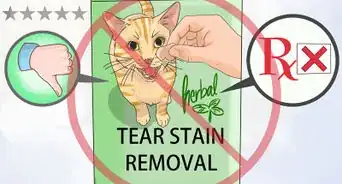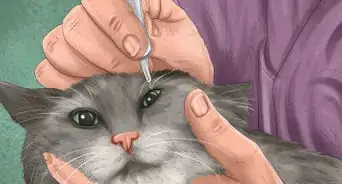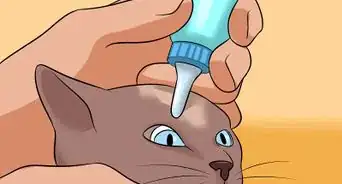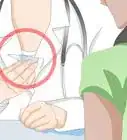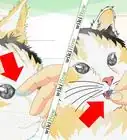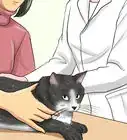This article was co-authored by Natalie Punt, DVM. Dr. Natalie Punt is a Veterinarian and the Founder and CEO of mPet- a smart phone app for pet owners to store, manage and transfer their pets medical records and health information. She specializes in small animal emergency and general medicine and veterinary practice economics. Dr. Punt holds a BS in Biochemistry and Molecular Biology from The University of California, Davis, an MS in Biochemistry from The University at Buffalo, and a DVM from Western University of Health Sciences.
There are 11 references cited in this article, which can be found at the bottom of the page.
This article has been viewed 15,917 times.
Eye inflammation in cats can come from a variety of causes. Therefore, it's important to know the cause first before attempting to treat it. In general, anti-inflammatories can be used to help alleviate the symptom, but any condition that's causing it, such as a virus, a bacterial infection, a foreign object, or allergies, also needs to be addressed.
Steps
Determining the Cause
-
1Look for other symptoms. If you've noticed eye inflammation, you should look for additional symptoms your cat may be having. For instance, your cat may have discharge around the eyes. The cat may also squint, rub its eye, or have more tears than normal.[1]
- Other symptoms may include sensitivity to light, a change to the shape or size of the pupil, or color changes in the eye.[2]
- It's important to note other symptoms because that will help the vet narrow down the specific cause, making it easier to treat the problem.
-
2Visit the vet. If you notice your cat has eye inflammation, your first step should be to take the cat to the vet. The vet will be able to narrow down the cause and help you decide on a treatment.[3] [4]Advertisement
-
3Expect an eye examination. While examining your cat, the vet will need to perform an eye examination. Often, that will include a dye test, where the vet puts a dye in your cat's eye. Then the vet can better see into the eye, making it easier to diagnose the problem.[5]
-
4Ask about blood tests and other tests. Blood tests may be needed to help diagnose any underlying conditions. While a cause cannot always be found, a blood test can at least help narrow down the possibilities. Your cat may need other tests as well, such as a urine test.[6]
Treating the Symptoms
-
1Use anti-inflammatories. The first step for treatment is anti-inflammatories. These can be applied topically or given as a pill. Your vet may also inject some into or near the eye to help treat the condition.[7]
-
2Discuss if the vet needs to remove a foreign object. In some cases, the cause of the inflammation is something your cat got in its eye. The cat will likely need to be sedated before the vet removes the object.[8]
-
3Give your cat antibiotic eye drops. Often, antibiotic eye drops will be needed to help treat the problem, particularly if the vet removed a foreign object or if they eye has been scratched at all. The eye drops will help reduce the chance of infection.[9]
Treat Underlying Causes
-
1Ask about antiviral treatments. Often, the underlying cause will be a viral infection. If that's the case, the cat will need to be given antivirals to treat that condition. However, not all viral infections can be treated directly through medication.
- A common viral infection includes herpes.[10] The effects of herpes can be lessened by L-lysine (an amino acid supplement), famciclovir (an antiviral), trifluridine (antiviral eye drops), and/or betadine (antiviral eye drops). Although these medications aren’t licensed for use in cats, your veterinarian may still prescribe them to your cat for use at your own risk.
- The calici virus is another potential diagnosis. With this virus, treatment will be focused on the symptoms, including pain medications and antibiotics to prevent other infections.
-
2Give your cat antibiotics. Your vet will often recommend antibiotics, particularly if the inflammation is caused by an injury or an underlying bacterial infection (cold). Antibiotics are also given to help ward off other infections.
- Mycoplasma, bordatella, and chlamydia can all be treated with antibiotics.
-
3Ask about getting medications for “dry eye.” With this common eye condition, your cat’s eye can’t produce enough tear fluid to keep the surface of the eye moist. This creates inflammation and a thick, tacky discharge. Your vet will likely prescribe medications that are placed directly on the eye to stimulate tear production, replace the tear fluid, or both.[11]
- Your vet might prescribe cyclosporine or tacrolimus.
-
4Treat allergies. Allergies can be a cause of eye inflammation, and therefore, treating the allergies can help.[12] Your vet may recommend an antihistamine to diminish the cat's reactions to allergens. Steroids can also be useful on occasion.[13]
- Ask the vet about an omega-3 fatty acid supplement, which may help your cat's allergies.
- You can try giving your cat Benadryl, but this is more effective in dogs.[14]
- You can also take steps to minimize allergens by limiting your cat's exposure to the outdoors, as well as changing up the cat's food to find one your cat doesn't react to.[15]
-
5Discuss if anti-fungals are appropriate. At times, anti-fungals may be necessary to treat the underlying problem. For instance, if the cat has a fungal infection on its eyelids, the vet may prescribe an anti-fungal cream to help treat the issue.[16]
-
6Understand surgery may be necessary. In some cases of inflammation, such as uveitis, your cat may need surgery. Generally, your cat will need surgery if it has a more serious underlying condition, such as cancer, in which case the eye may need to be removed.
- Another condition where your cat will need surgery is if the lens moves out of place. The vet will need to put it back.[17]
Expert Q&A
-
QuestionHow can I treat my cat's eye allergies?
 Natalie Punt, DVMDr. Natalie Punt is a Veterinarian and the Founder and CEO of mPet- a smart phone app for pet owners to store, manage and transfer their pets medical records and health information. She specializes in small animal emergency and general medicine and veterinary practice economics. Dr. Punt holds a BS in Biochemistry and Molecular Biology from The University of California, Davis, an MS in Biochemistry from The University at Buffalo, and a DVM from Western University of Health Sciences.
Natalie Punt, DVMDr. Natalie Punt is a Veterinarian and the Founder and CEO of mPet- a smart phone app for pet owners to store, manage and transfer their pets medical records and health information. She specializes in small animal emergency and general medicine and veterinary practice economics. Dr. Punt holds a BS in Biochemistry and Molecular Biology from The University of California, Davis, an MS in Biochemistry from The University at Buffalo, and a DVM from Western University of Health Sciences.
Veterinarian You should have your cat evaluated and diagnosed with allergies or eye issues by a veterinarian. If they do have allergies, you can try some general environmental modifications, like taking out the allergens from the household whenever possible.
You should have your cat evaluated and diagnosed with allergies or eye issues by a veterinarian. If they do have allergies, you can try some general environmental modifications, like taking out the allergens from the household whenever possible. -
QuestionWhat can trigger eye allergies in cats?
 Natalie Punt, DVMDr. Natalie Punt is a Veterinarian and the Founder and CEO of mPet- a smart phone app for pet owners to store, manage and transfer their pets medical records and health information. She specializes in small animal emergency and general medicine and veterinary practice economics. Dr. Punt holds a BS in Biochemistry and Molecular Biology from The University of California, Davis, an MS in Biochemistry from The University at Buffalo, and a DVM from Western University of Health Sciences.
Natalie Punt, DVMDr. Natalie Punt is a Veterinarian and the Founder and CEO of mPet- a smart phone app for pet owners to store, manage and transfer their pets medical records and health information. She specializes in small animal emergency and general medicine and veterinary practice economics. Dr. Punt holds a BS in Biochemistry and Molecular Biology from The University of California, Davis, an MS in Biochemistry from The University at Buffalo, and a DVM from Western University of Health Sciences.
Veterinarian Lots of things! From the type of laundry detergent you use to certain plants and even your AC unit. Another important thing you should take a look at is your cat diet.
Lots of things! From the type of laundry detergent you use to certain plants and even your AC unit. Another important thing you should take a look at is your cat diet.
References
- ↑ http://www.pethealthnetwork.com/cat-health/cat-diseases-conditions-a-z/eye-inflammation-cats
- ↑ https://animaleyecare.net/informational/feline-uveitis
- ↑ http://www.pethealthnetwork.com/cat-health/cat-diseases-conditions-a-z/eye-inflammation-cats
- ↑ Natalie Punt, DVM. Veterinarian. Expert Interview. 14 September 2021.
- ↑ https://animaleyecare.net/informational/conjunctivitis-and-corneal-disease-in-cats
- ↑ http://www.merckvetmanual.com/special-pet-topics/emergencies/eye-emergencies
- ↑ https://vcahospitals.com/know-your-pet/conjunctivitis-in-cats
- ↑ http://www.peteducation.com/article.cfm?c=1+2124&aid=3552
- ↑ https://animaleyecare.net/informational/conjunctivitis-and-corneal-disease-in-cats
- ↑ Natalie Punt, DVM. Veterinarian. Expert Interview. 14 September 2021.
- ↑ https://vcahospitals.com/know-your-pet/keratoconjunctivitis-sicca-kcs-or-dry-eye-in-cats
- ↑ Natalie Punt, DVM. Veterinarian. Expert Interview. 14 September 2021.
- ↑ http://www.peteducation.com/article.cfm?c=1+2141&aid=505
- ↑ Natalie Punt, DVM. Veterinarian. Expert Interview. 14 September 2021.
- ↑ Natalie Punt, DVM. Veterinarian. Expert Interview. 14 September 2021.
- ↑ http://www.peteducation.com/article.cfm?c=1+2124&aid=3552
- ↑ http://www.peteducation.com/article.cfm?c=1+2124&aid=3552
About This Article
To treat a cat with eye inflammation, visit your vet so they can identify the cause and help you decide on a treatment plan. Depending on the condition, your vet may prescribe an anti-inflammatory pill or topical cream to treat its eye. Alternatively, your vet may remove a foreign object, which will require your cat to be sedated. Afterwards, you may need to give your cat antibiotic or antiviral eye drops to deal with an underlying infection. For tips from our Veterinary co-author on how to treat a cat with dry eye, read on!
